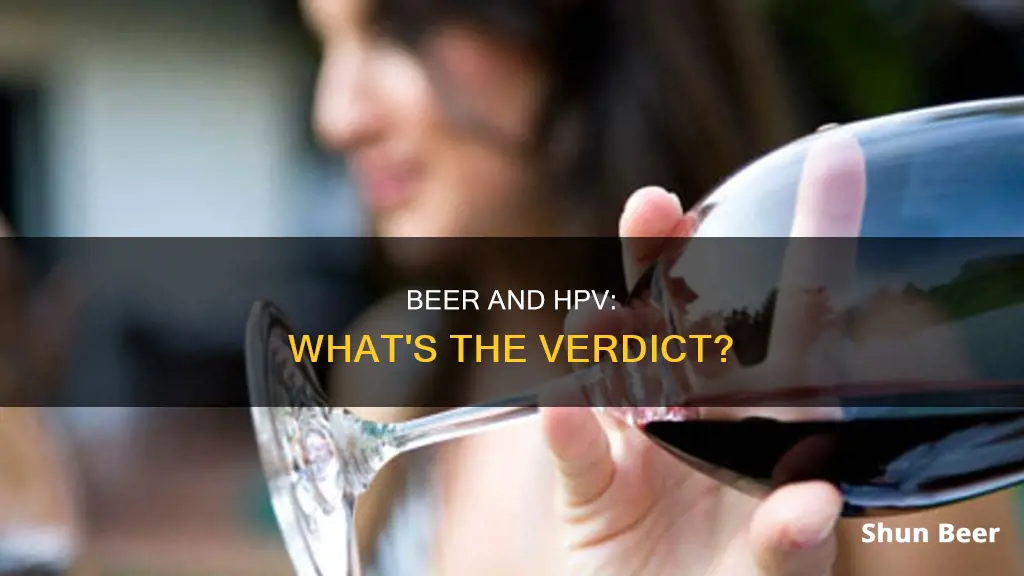
Human Papillomavirus (HPV) is a common sexually transmitted infection that can cause various cancers and genital warts. While HPV is primarily transmitted through sexual contact, it can also be spread through non-sexual means, such as kissing and skin-to-skin contact. So, can drinking alcohol increase the risk of persistent HPV infection? Recent research suggests that there may be a link between alcohol consumption and the risk of HPV infection, particularly in women. Let's explore this topic further and find out if drinking beer or any other alcoholic beverage can impact your health if you have HPV.
| Characteristics | Values |
|---|---|
| Can HPV be spread by drinking after someone? | No, HPV cannot be spread by drinking after someone. |
| How is HPV transmitted? | HPV is transmitted through skin-to-skin contact with an infected person, including sexual contact, such as vaginal, anal, and oral sex. |
| Can HPV be transmitted through saliva? | HPV can be transmitted through saliva, but only if there is a large exchange of saliva that goes directly from one person to another. |
| Can HPV be transmitted through kissing? | HPV can be transmitted through deep kissing (French kissing) with an infected individual, but this mode of transmission is rare. |
| Can HPV be transmitted through objects? | HPV can be transmitted through objects that come into contact with the genital area of an infected person, such as shared towels, underwear, or sex toys. |
| Can HPV be transmitted through hand-to-hand contact? | Simple hand contact, like a handshake, is not a means of transmitting HPV. However, if an infected person touches their genital area and then touches another person's genital area, the risk of transmission is high. |
| Risk factors for HPV transmission | The risk of HPV transmission depends on factors such as the type of HPV, number of sexual partners, frequency of sexual activity, and use of protection. |
What You'll Learn

Alcohol consumption and its impact on the immune system
While drinking alcohol does not directly transmit HPV, it can weaken the immune system, making the body more vulnerable to infections and diseases. The immune system is designed to fight off infections, diseases, and toxins, and alcohol consumption can negatively impact both the innate and adaptive immune systems.
The innate immune system provides general immunity by responding to viruses, bacteria, and other microorganisms that can cause disease. On the other hand, the adaptive immune system is responsible for immune memory, remembering previous infections and preventing them from occurring again. Alcohol consumption can suppress the immune system, even with a single session of 5-6 drinks, and this suppression can last for up to 24 hours.
Long-term alcohol consumption can lead to even more severe problems, as the immune system takes longer to recognize and respond to infections. This can result in more intense illnesses, prolonged symptoms, and increased difficulty in fighting off infections. Alcohol can also impact the cells in the airways, reducing their ability to remove mucus from the lungs, which can lead to a higher risk of developing serious conditions like pneumonia from common respiratory tract infections.
Additionally, alcohol can affect the gastrointestinal (GI) tract, altering the number and variety of 'good' bacteria that are necessary for healthy immune function. This disruption to the gut microbiota can have implications beyond the intestinal system, affecting the body's ability to defend against infection and contributing to organ damage.
In terms of HPV, while it is primarily transmitted through sexual contact, there is a potential link between HPV infections and oral sex. However, the risk of transmission through saliva is relatively low, and it requires a large exchange of saliva, such as in deep partner kisses. While drinking after someone is not a direct means of transmitting HPV, it is still not advisable due to the possibility of transmitting other diseases or infections.
Drinking NA Beer: Safe Driving or Legal Trouble?
You may want to see also

The link between drinking and cervical abnormalities
It is important to note that there is a link between alcohol consumption and an increased risk of persistent Human Papillomavirus (HPV) infection in women, according to research conducted by Korean researchers. This is significant because certain strains of HPV can lead to cervical abnormalities and cancer. The research found that women who drank alcohol were almost three times more likely to test positive for HPV than non-drinkers, and this risk increased with the amount of alcohol consumed. Specifically, women who drank three or more glasses of beer in one sitting were three times as likely to test positive for HPV.
While the exact reason for the link between alcohol consumption and persistent HPV infection is unknown, the researchers suggested that alcohol may lead to folate deficiency, which could alter a person's DNA and increase the risk of cancer. Furthermore, alcohol use has been identified as a risk factor for cervical spinal cord injury, which can result in life-altering changes and severe respiratory complications.
Therefore, it is essential to be aware of the potential risks associated with alcohol consumption, especially for individuals who may be at risk of HPV infection or have a history of cervical spinal issues. While occasional drinking may not pose a significant risk, excessive alcohol consumption can have negative health consequences.
Wellbutrin and Beer: Is It Safe to Mix?
You may want to see also

Binge drinking and its association with high-risk behaviours
Binge drinking is defined as a pattern of drinking that brings blood alcohol concentration (BAC) to 0.08% or more. This typically happens when a woman consumes four or more drinks or a man consumes five or more drinks within about two hours. Binge drinking is associated with a range of acute alcohol-related harms, such as alcohol poisoning, blackouts, and an increased likelihood of unsafe sexual behaviour, which can lead to sexually transmitted infections and unintentional pregnancies. Research has also shown that binge drinking can alter the trajectory of adolescent brain development and cause lingering deficits in social, attention, memory, and other cognitive functions.
Women who drink alcohol may have an increased risk of persistent infection with the human papillomavirus (HPV), according to researchers in Korea. The study found that women who drank three or more glasses of beer in one sitting were three times as likely to test positive for HPV compared to non-drinkers. The more women drank, the greater the odds of their having persistent HPV.
While it is not known why drinkers may face a higher risk of persistent HPV infection, the researchers suggested that alcohol may lead to folate deficiency, which could alter a person's DNA and increase the risk of cancer.
Should Labradors Drink Beer? A Pet Owner's Guide
You may want to see also

The effect of alcohol on folate levels in the body
Alcohol consumption has been linked to an increased risk of persistent Human Papillomavirus (HPV) infection in women, according to research conducted in Korea. This may be due to alcohol leading to folate deficiency, which can alter DNA and increase the risk of cancer.
Folate, also known as vitamin B9, is essential for the body's metabolic processes and plays a crucial role in DNA synthesis and stability. Chronic alcohol consumption can lead to folate deficiency through several mechanisms:
- Reduced dietary folate intake: Alcohol can displace folate in the diet, leading to an overall lower intake.
- Intestinal malabsorption: Alcohol can impair the absorption of folate in the small intestine, reducing the amount available for the body to utilise.
- Reduced liver uptake and storage: The liver is the primary storage organ for folate, and alcohol can interfere with the transport and storage of folate within the liver.
- Increased urinary folate excretion: Alcohol can cause the body to excrete more folate through urine, leading to overall lower levels in the body.
The impact of alcohol on folate levels can occur rapidly, with studies showing a decrease in serum folate levels within eight hours of alcohol consumption. This decrease is temporary, and folate levels return to normal once alcohol consumption is stopped. However, chronic alcohol consumption can lead to long-term folate deficiency, which has been observed in 80% of chronic alcoholics admitted to a US hospital.
Folate deficiency can have serious health consequences, including megaloblastic anaemia and neurological disorders. Additionally, folate deficiency can increase the risk of cancer by altering DNA stability. Therefore, it is important to be mindful of the impact of alcohol consumption on folate levels and to ensure adequate folate intake, especially for those at risk of folate deficiency.
Beer and Azithromycin: Is It Safe to Mix?
You may want to see also

The prevalence of HPV and drinking among young adults
Human papillomavirus (HPV) is a common sexually transmitted infection that can cause various complications, including cancers and genital warts. While HPV is primarily transmitted through sexual contact, it can also be spread through non-sexual means, such as kissing and the sharing of personal items.
The consumption of alcohol is known to impair the normal functioning of the immune system, making individuals more susceptible to infections such as HPV. Research has shown a link between alcohol consumption and an increased risk of persistent HPV infection, particularly among young adults. A study by Korean researchers found that women who drank alcohol were almost three times more likely to test positive for HPV compared to non-drinkers. The risk was even higher for those who had been drinking for five or more years and those who consumed larger amounts of alcohol.
Binge drinking is also associated with a higher risk of HPV infection. A study of young adults in the United States found that binge drinkers were more likely to engage in high-risk behaviours related to HIV/HPV co-infection. Additionally, alcohol consumption has been linked to folate deficiency, which can alter a person's DNA and increase the risk of cancer.
Unlimited Beer Ads: Legal and Ethical Considerations
You may want to see also







